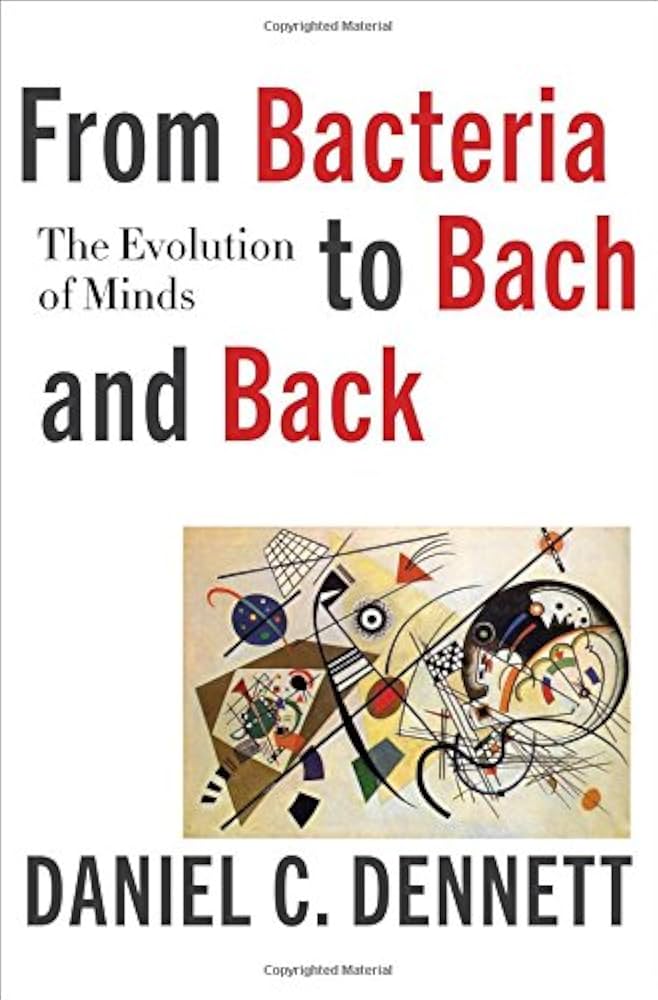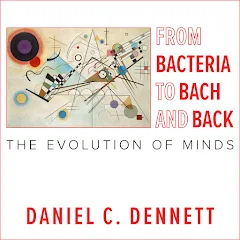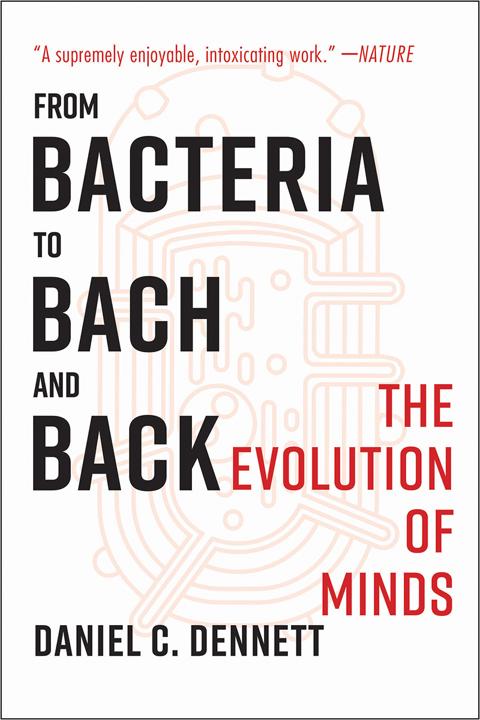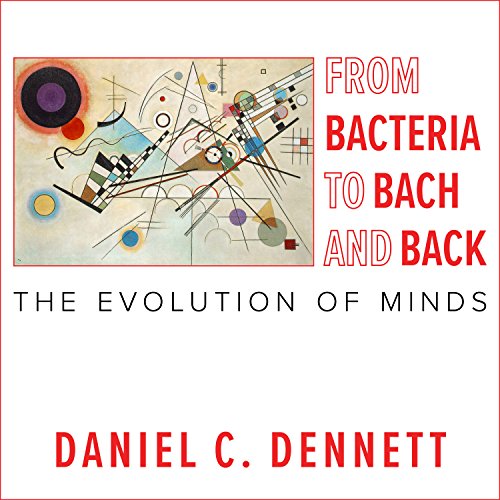Daniel C. Dennett’s audiobook “From Bacteria to Bach and Back” explores the evolution of human consciousness. It examines how culture and biology shape our minds.
Daniel C. Dennett’s “From Bacteria to Bach and Back” delves into the intricate evolution of human consciousness. Dennett investigates the relationship between biology and culture in shaping our minds. He provides an insightful look into how simple organisms like bacteria evolved into complex beings capable of creating cultural phenomena such as Bach’s music.
The book merges concepts from biology, cognitive science, and philosophy to offer a comprehensive understanding of human cognition. This audiobook is essential for those interested in the origins of consciousness and the intricate dance between nature and nurture. Dennett’s engaging narrative makes complex scientific ideas accessible and intriguing.
Early Life Of Daniel Dennett
Daniel C. Dennett, a renowned philosopher and cognitive scientist, has made significant contributions to our understanding of consciousness and the mind. His early life played a crucial role in shaping his intellectual journey. Born in Boston in 1942, Dennett’s formative years were filled with rich experiences and influences.
Influences And Academic Background
Dennett’s father, Daniel Clement Dennett Jr., was a historian and a spy during World War II. His mother, Ruth Marjorie Leck, was an English teacher. Their professions exposed young Dennett to a world of ideas and critical thinking.
Daniel Dennett attended Phillips Exeter Academy, a prestigious prep school. He later enrolled at Harvard University, where he studied philosophy. There, he was influenced by the works of Gilbert Ryle and W.V.O. Quine.
In 1965, Dennett earned his Ph.D. in philosophy from the University of Oxford. At Oxford, he studied under the famous philosopher Gilbert Ryle. This academic background laid the foundation for his future work.
Pioneering Cognitive Science
Dennett’s early academic achievements positioned him at the forefront of cognitive science. He began exploring the nature of consciousness and the mind. His work often intersected with neuroscience, psychology, and artificial intelligence.
One of Dennett’s significant contributions is his theory of consciousness as a collection of mental processes. He challenged traditional views, suggesting that consciousness is not a single, unified entity.
In his book “From Bacteria to Bach and Back,” Dennett explores the evolution of the mind. He traces its development from simple organisms to complex human cognition. This work is a testament to his pioneering spirit in cognitive science.
Dennett’s interdisciplinary approach has made him a key figure in understanding the human mind. His early life and academic background were crucial in shaping his groundbreaking ideas.

Core Concepts In ‘from Bacteria To Bach And Back’
Daniel C. Dennett’s audiobook, ‘From Bacteria to Bach And Back’, explores the evolution of the human mind. Dennett dives into how simple organisms evolved into complex thinkers. He examines key concepts like evolution, intentionality, and consciousness.
The Evolution Of Minds
Dennett discusses the journey from single-celled bacteria to human minds. He explains how natural selection shaped intelligence. Simple organisms developed survival strategies. These strategies became more complex over time. Minds evolved to solve problems and make decisions.
| Stage | Description |
|---|---|
| Bacteria | Single-celled organisms with basic survival skills |
| Early Animals | Multicellular life forms with simple nervous systems |
| Humans | Complex beings with advanced cognitive abilities |
Intentionality And Consciousness
Dennett explores the concept of intentionality. This is the ability to have thoughts and intentions. He argues that intentionality evolved over time. Early organisms acted without thought. Over time, behaviors became more intentional.
Consciousness is another key topic. Dennett describes it as a product of evolution. He suggests that consciousness emerged from simpler mental processes. These processes became more complex. Eventually, they formed what we now call consciousness.
- Intentionality: Thoughts and intentions
- Consciousness: Awareness of self and surroundings
- Evolution: Process by which simpler forms became complex
Dennett’s audiobook provides a fascinating journey through the evolution of minds. It’s a deep dive into how we think and why we think the way we do.
Natural Selection’s Role In Consciousness
Daniel C. Dennett’s audiobook From Bacteria to Bach and Back explores how consciousness evolves. He delves into the role of natural selection in shaping our minds. Let’s break down this complex topic into simpler parts.
Darwinian Processes
Natural selection, first explained by Charles Darwin, is a key process in evolution. It involves the survival and reproduction of organisms best suited to their environment. Traits that help organisms survive get passed down through generations. This process applies not just to physical traits but also to mental capabilities.
Consider how animals develop instincts. These behaviors evolve because they help animals survive and reproduce. Birds learn to build nests, and spiders spin webs. These actions result from countless generations of natural selection.
From Simple Organisms To Complex Minds
Early life forms, like bacteria, have very simple ways of interacting with their surroundings. They respond to basic stimuli, like light and food. Through millions of years, these simple mechanisms evolved into more complex forms of awareness.
Animals like fish and birds have more advanced nervous systems. They can learn from their environment and adapt. This learning ability increases their chances of survival.
Humans have the most complex minds. Our brains process information, solve problems, and create art. Natural selection played a critical role in this evolution. Our ancestors who could think and plan better had a survival advantage. This led to the development of human consciousness.
In summary, natural selection is not just about physical traits. It also shapes the mind, leading from simple responses in bacteria to complex human thoughts.
Language Development And Cultural Evolution
In Daniel C. Dennett’s audiobook, From Bacteria to Bach And Back, he explores the fascinating journey of language development and cultural evolution. Dennett delves into how humans transitioned from basic communication to complex languages. This transformation plays a crucial role in shaping our cultures.
The Birth Of Language
Language didn’t appear overnight. It evolved gradually. Early humans relied on gestures and sounds. Over time, these sounds became more structured. Words formed, and then sentences. This transformation enabled more precise communication.
Language allowed humans to share knowledge. This sharing led to faster learning and adaptation. People could now convey complex ideas and emotions. This ability set humans apart from other species.
| Stage | Characteristics |
|---|---|
| Gestures | Basic hand and body movements |
| Sounds | Primitive vocalizations |
| Words | Simple words representing objects and actions |
| Sentences | Structured phrases and complex ideas |
Cultural Transmission And Memetics
Cultural evolution goes hand in hand with language. Dennett introduces the concept of memetics. Memes are units of cultural information. They spread through imitation and learning.
Think of memes as cultural genes. They replicate and evolve. Some memes thrive, while others fade away. Language plays a key role in this process.
- Memes spread ideas and practices
- Language is the medium for memes
- Strong memes shape societies
With language, humans can transmit complex memes. This transmission accelerates cultural growth. The better we communicate, the faster we evolve culturally.
Dennett’s Interpretation Of Free Will
Daniel C. Dennett’s audiobook, From Bacteria to Bach and Back, offers a deep dive into the concept of free will. Dennett explores whether humans truly have autonomy or if it is merely an illusion. This section will delve into his interpretation of free will, focusing on two key aspects: the illusion of autonomy and compatibilism.
The Illusion Of Autonomy
Dennett argues that the feeling of autonomy might be an illusion. He suggests that our decisions are influenced by many unseen factors. These factors include genetics, environment, and past experiences. According to Dennett, our brains process these influences, giving us the sense of making independent choices. This process can be complex, making it hard to see the underlying influences.
He uses examples from everyday life to illustrate his point. For instance, consider your choice of breakfast cereal. You may feel you chose freely, but many factors influenced you. Advertising, availability, and even childhood memories play a role. This makes the autonomy of your choice questionable.
Compatibilism Explained
Dennett also delves into the concept of compatibilism. Compatibilism is the idea that free will and determinism can coexist. He explains that even if our choices are influenced, we can still have free will. This is because we can reflect on our actions and make decisions based on that reflection.
| Term | Definition |
|---|---|
| Determinism | Every event is caused by previous events. |
| Free Will | The ability to make choices independently. |
| Compatibilism | Free will and determinism can coexist. |
In Dennett’s view, compatibilism offers a middle ground. It acknowledges the influence of external factors while preserving our sense of autonomy. This approach allows for responsibility and moral accountability. We can still be held responsible for our actions, even if they are influenced by external factors.
In conclusion, Dennett’s interpretation of free will challenges our understanding of autonomy. By exploring the illusion of autonomy and compatibilism, he provides a nuanced view of human decision-making. This makes From Bacteria to Bach and Back a thought-provoking listen.

Criticisms And Controversies
Daniel C. Dennett‘s audiobook, From Bacteria to Bach and Back, dives deep into the evolution of minds. While many praise his insights, the work has faced criticisms and controversies. This section explores some of the main objections and counterarguments.
Philosophical Objections
Some philosophers argue that Dennett oversimplifies complex ideas. They believe he reduces consciousness to mere computational processes. Others say his theories lack depth on subjective experiences. They feel Dennett’s approach dismisses the qualia, the unique personal experiences of perception.
Critics also point out that Dennett’s ideas can seem deterministic. They argue this viewpoint negates free will. Philosophers who value human agency find this troubling.
Scientific Counterarguments
Some scientists challenge Dennett’s evolutionary explanations. They argue that his ideas about cultural evolution are speculative. Critics believe he stretches biological concepts too far into the cultural realm.
Another point of contention is Dennett’s reliance on memes. Many biologists and anthropologists criticize the meme theory. They argue it lacks empirical support and scientific rigor.
Finally, some neuroscientists question Dennett’s interpretations of brain research. They believe he oversimplifies the complexities of neural processes. They argue that his views do not fully align with current scientific understanding.
Impact And Legacy
Daniel C. Dennett’s audiobook, ‘From Bacteria to Bach And Back’, has left a lasting legacy. Its influence spans across contemporary thought, philosophy, and science. Dennett’s ideas continue to shape modern discussions on consciousness and evolution.
Influence On Contemporary Thought
Dennett’s audiobook challenges traditional views on consciousness. It bridges the gap between biology and culture. His work inspires new ways to think about the mind’s evolution.
Modern thinkers use Dennett’s ideas to explore human cognition. His theories are applied in various fields, including artificial intelligence. This has led to groundbreaking research and innovations.
Contributions To Philosophy And Science
Dennett has made significant contributions to both philosophy and science. His theories offer a new perspective on the nature of consciousness.
He combines insights from biology, psychology, and cognitive science. This interdisciplinary approach has enriched both fields. Scholars and researchers build on Dennett’s work to deepen our understanding of the mind.
| Field | Contribution |
|---|---|
| Philosophy | New theories on consciousness |
| Science | Interdisciplinary research combining biology and psychology |
Dennett’s ideas have also led to practical applications. His influence extends to technology and education. This ensures his legacy will endure for generations.
Exploring The Audiobook Experience
The audiobook for Daniel C. Dennett’s From Bacteria to Bach and Back offers a unique way to engage with his intricate ideas. Listening to the audiobook provides a different experience compared to reading the text. Let’s dive into what makes this audiobook special.
Narration And Delivery
The audiobook is narrated by Tom Perkins, whose voice adds depth to Dennett’s words. Perkins’ narration makes the complex concepts more accessible. His tone keeps listeners engaged throughout the book. The delivery is clear, making it easier to follow the dense material. Each chapter feels like a guided tour through Dennett’s mind.
Listeners can pause and replay sections. This flexibility is perfect for those who need to hear key points again. The narrator’s pace is steady, ensuring that no detail is missed. The audiobook format allows listeners to absorb the content during daily activities.
Comparing Text To Audio
Comparing the text to the audio version reveals distinct advantages. The audiobook offers auditory engagement, which can enhance understanding. For visual learners, reading the text might be preferable. But auditory learners will find the audiobook more effective.
| Aspect | Text Version | Audio Version |
|---|---|---|
| Engagement | Requires focused reading time | Can be listened to during other activities |
| Comprehension | Visual learning through reading | Auditory learning through listening |
| Flexibility | Less flexible, needs quiet environment | More flexible, can pause and replay |
Both formats have their strengths. The text version allows for detailed note-taking and highlighting. The audiobook provides a dynamic experience with the added benefit of hearing Dennett’s ideas spoken aloud. This can bring a new dimension to his work.
In summary, the audiobook of From Bacteria to Bach and Back offers an engaging alternative to the text. It provides a different way to explore Dennett’s philosophical journey.

Frequently Asked Questions
What Is “from Bacteria To Bach And Back” About?
“From Bacteria to Bach And Back” explores the evolution of human consciousness. Dennett examines how simple biological processes lead to complex human culture.
Who Is Daniel C. Dennett?
Daniel C. Dennett is a renowned philosopher and cognitive scientist. He specializes in the philosophy of mind and evolutionary biology.
Is The Audiobook Narrated By The Author?
Yes, the audiobook is narrated by Daniel C. Dennett himself. His narration adds depth and understanding to the content.
How Long Is The Audiobook?
The audiobook of “From Bacteria to Bach And Back” is approximately 15 hours long. It provides a comprehensive exploration of Dennett’s theories.
Conclusion
Dennett’s audiobook offers profound insights into the evolution of consciousness. It bridges the gap from bacteria to human intellect. This journey is fascinating for anyone curious about the mind’s development. Dive in and explore how complex thoughts emerge from simple beginnings.
Don’t miss this captivating exploration of human cognition.



